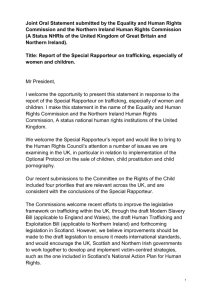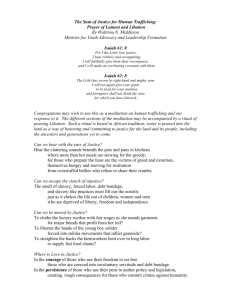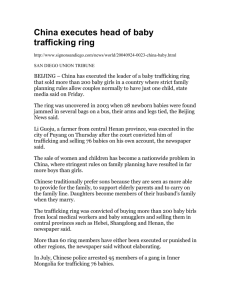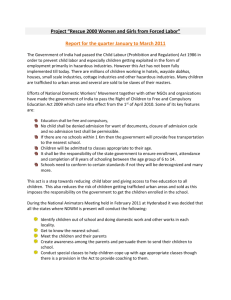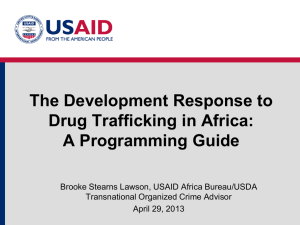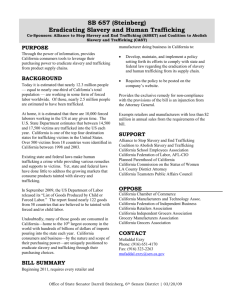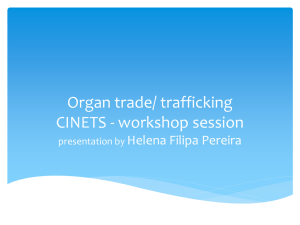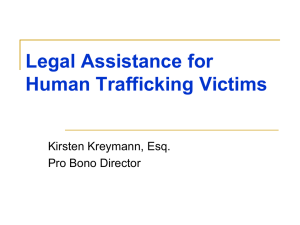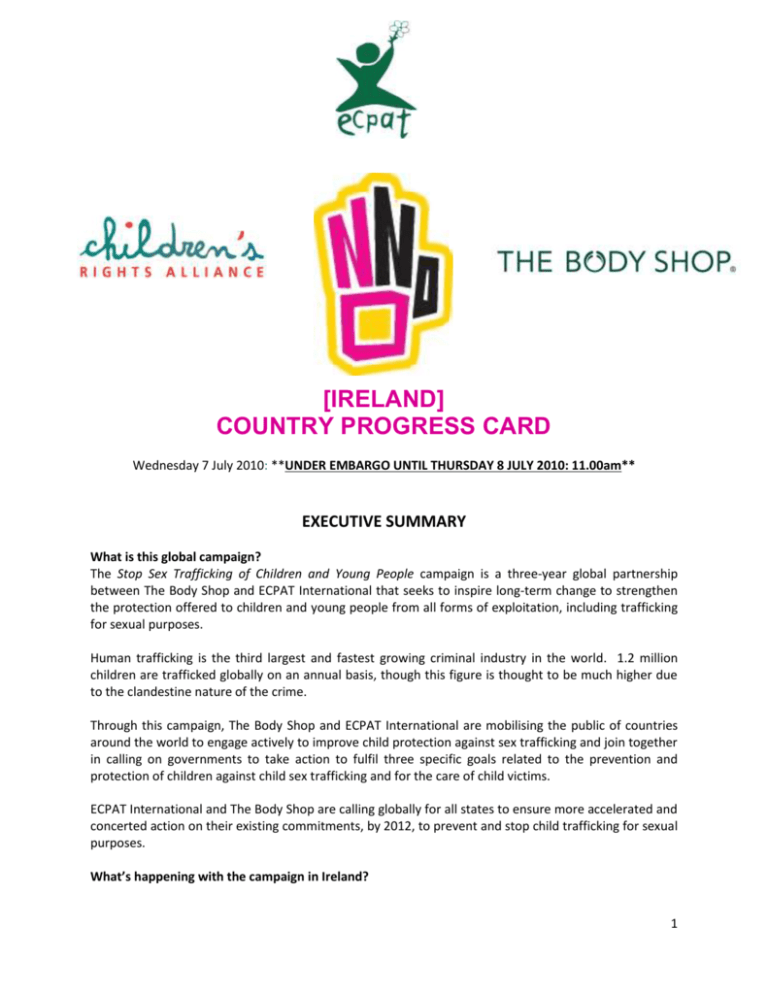
[IRELAND]
COUNTRY PROGRESS CARD
Wednesday 7 July 2010: **UNDER EMBARGO UNTIL THURSDAY 8 JULY 2010: 11.00am**
EXECUTIVE SUMMARY
What is this global campaign?
The Stop Sex Trafficking of Children and Young People campaign is a three-year global partnership
between The Body Shop and ECPAT International that seeks to inspire long‐term change to strengthen
the protection offered to children and young people from all forms of exploitation, including trafficking
for sexual purposes.
Human trafficking is the third largest and fastest growing criminal industry in the world. 1.2 million
children are trafficked globally on an annual basis, though this figure is thought to be much higher due
to the clandestine nature of the crime.
Through this campaign, The Body Shop and ECPAT International are mobilising the public of countries
around the world to engage actively to improve child protection against sex trafficking and join together
in calling on governments to take action to fulfil three specific goals related to the prevention and
protection of children against child sex trafficking and for the care of child victims.
ECPAT International and The Body Shop are calling globally for all states to ensure more accelerated and
concerted action on their existing commitments, by 2012, to prevent and stop child trafficking for sexual
purposes.
What’s happening with the campaign in Ireland?
1
In Ireland, The Body Shop has joined hands with the Children’s Rights Alliance on this campaign. The
Children's Rights Alliance is a coalition of over 90 non‐governmental organisations (NGOs) working to
secure the rights and needs of children in Ireland, by campaigning for the full implementation of the UN
Convention on the Rights of the Child (UNCRC). Over the past number of years, the Alliance has
consistently raised our serious concerns about the level of care being provided to separated children
and the alarmingly high number of children who have gone missing.
What is the problem?
The Ombudsman for Children, the Special Rapporteur on Child Protection, opposition politicians and
NGOs have all raised concerns about missing children and child trafficking. Separated children are at
particular risk of being trafficked.
Over 500 children have gone missing from State care since 2000, with a shocking 90% of them
still missing. It is feared that many of these vulnerable children have been trafficked.
In 2008, the Government investigated 96 cases of potential trafficking but there were no
prosecutions or convictions. In 2009, there were 68 investigations relating to human trafficking,
52 of which involve a direct investigation. Also, in 2009, there was one conviction in relation to
a minor under the Child Trafficking and Pornography Act 1998. The Alliance understands that
there is at least one other child trafficking case pending.
Ireland is considered, primarily, as a destination for child trafficking, but also as a transit point
for children trafficked to the UK – increasingly, the border crossing between Northern Ireland
and the Republic is being used, as well as the Ireland‐Wales ferry crossings.
Ireland has also been identified as a source country for tourists seeking sex with children,
travelling to destinations such as the Philippines and Thailand.
According to a senior Garda source, human trafficking gangs are increasingly organising the
trafficking of separated children who are taken into the care of the HSE on arrival in Ireland. The
placement of separated children in privately run hostels which lack the necessary adult
supervision and care has been directly linked to instances of children going missing. There is
evidence that some of these children have ended up in the sex trade in Ireland and abroad.
How is Ireland’s progress on combating child trafficking?
Ireland is among the 53% of countries reviewed that have made some progress to stop sex trafficking of
children and young people. 42 international countries were rated by ECPAT International.
Ratings for EU states
Ireland is among the poorest performing EU states in combating child sex trafficking - rated
number 22 on international list and number 13 on EU list (20 EU states are graded in the report)
Romania is the best state worldwide in its efforts to combat child sex trafficking, followed by
Denmark and the UK, who have all made notable efforts
Belgium is at the top of the ‘Some Progress’ list, with Spain, France, Italy, Netherlands, Austria,
Finland and Germany all ahead of Ireland
Cyprus, Greece, Sweden and the Czech Republic are all categorized as having ‘limited measures’
in place
2
The Irish Government has made important steps in combating child trafficking:
publication of a National Action Plan to Prevent and Combat Trafficking in Human Beings in
Ireland 2009‐2012;
a strengthened legal framework against trafficking.
But Ireland has yet to ratify some international legal standards addressing child trafficking; and it needs
to improve the accommodation, care and protection services provided for separated children and child
victims, and suspected victims, of trafficking.
See table: this is an updated grading and ranking of states’ efforts to combat child trafficking as of JUNE
2010.
What is the solution?
There are three specific goals, under which there are a number of recommendations:
A. Community‐Based Prevention Measures on Child Trafficking
3
Prevention: The Government should implement the specific provisions of its National Action
Plan to Prevent and Combat Trafficking in Human Beings in Ireland 2009‐2012 with the aim of
preventing child trafficking;
Collaboration: More synergies involving government agencies and civil society stakeholders
should be developed to design and implement joint child trafficking prevention initiatives;
Awareness-raising: The Government should support awareness raising programmes on child
trafficking for front line staff who work directly with children;
Teacher Training: The Government should include (as mandatory) new modules on child
trafficking in the training programmes of teachers and in the CSPE curriculum.
B. National Legal Framework Harmonisation with International Standards
Protocols: The Government should take steps to urgently ratify the UN Optional Protocol to the
Convention on the Rights of the Child on the sale of children, child prostitution and child
pornography; the UN Trafficking Protocol; the Council of Europe Convention on Action against
Trafficking in Human Beings; and the Council of Europe Convention on the Protection of
Children against Sexual Exploitation and Sexual Abuse;
National Legislation: The Immigration, Residence and Protection Bill 2010 should provide for the
statutory provision of comprehensive support for victims of trafficking, in line with the
provisions of the UN Trafficking Protocol;
Special Police Units: Specialised units run jointly by the Garda Síochána and the HSE, to deal with
child survivors of sexual crimes, should be upskilled to enable these units to work with child
victims of trafficking. Members of An Garda Síochána dealing with cases of child trafficking for
sexual purposes should be trained to implement the relevant legal framework in a
child‐sensitive manner.
C. Specialised Support Services for Child Victims of Trafficking
Helpline: The Government should fund the establishment of a 116‐000 missing children’s
number, in line with the European Commission recommendation;
Care and Protection: The HSE should develop special care and protection plans, including
appropriate accommodation, to meet the needs of victims or suspected victims of child
trafficking. The HSE should implement an ‘equity of care’ policy by December 2010, as
committed to in the Ryan Report Implementation Plan. This policy must be implemented in a
manner that ensures that no child is disadvantaged or placed at further risk;
Counselling: The HSE must ensure that all victims and suspected victims of child trafficking are
provided with timely and specialist psychological support.
Copy of Petition in Ireland:
Together, we can change the world. Join hands with the Children’s Rights Alliance, The Body Shop and
ECPAT International and trace your handprint in support of our petition:
Child trafficking is 21st century slavery. I support this campaign and demand that the Irish
Government does all in its power to stop child trafficking in Ireland. I call on the Government to:
1.
2.
Identify child victims and enforce laws to prosecute child traffickers.
Provide child victims with the support they need to escape their traffickers and rebuild their
lives.
4
Implement the Irish Government’s National Action Plan to Prevent and Combat Trafficking in
Human Beings 2009-2012.
4. Ratify the Optional Protocol to the UN Convention on the Rights of the Child on the Sale of
Children, Child Prostitution and Child Pornography.
3.
CASE STUDIES
Operation Pentameter: In 2006, a four‐month police crackdown to identify women and girls trafficked into the sex
industry rescued 84 people, including a girl of 14 years. The so called Operation Pentameter involved all 55 police
forces in the UK, Ireland and the Channel Islands. It led to 232 arrests. In all, 12 children aged 14 to 17 years were
rescued. Officers executed warrants in 515 brothels, massage parlours, private homes and other premises across
the UK and Ireland. About half of the rescued women and girls came from a range of Eastern European countries,
with the other half from the Far East, Africa and South America. A Pentameter spokeswoman said there was an
“emerging trend” of child victims from Africa and South America. 1
Teen missing from care forced to work in the sex industry: In 2007, a missing teenage asylum‐seeker who had
disappeared from the care of the Health Services Executive (HSE) was found enslaved and forced to work in the sex
industry in Sligo. The Nigerian girl, aged 17 years, was arrested when detectives raided a brothel in the town. She
had been placed into the care of the HSE after arriving in Ireland unaccompanied six months before. She ran away
shortly afterwards. Garda found the girl after they raided premises in Sligo town that they suspected was a brothel
being run by non‐Irish nationals. The girl was the second underage girl to be found involved in the sex industry in
Sligo. In 2006, detectives highlighted the case of another 17‐year‐old African girl who was being exploited in
prostitution.2
Trafficked from Romania: ‘C.’ is a 16‐year‐old Romanian girl, raised by her mother and who lived with her mother
and two siblings. When the mother remarried, her stepfather abused her sexually. The girl decided to leave,
persuaded by a girlfriend who was working as a prostitute. She thought that prostituting herself abroad was a
chance to raise money. She was taken to France and Italy, and ended up in Ireland. There, she was taken under
the control of a group of traffickers, who locked her in a flat, together with other girls. She was forced to
prostitute herself from 12 pm until 4 am. After a police raid she was repatriated to Romania. She has since been
supported by Save the Children and has returned to the education system, successfully passing her exams.3
Suspected Victim from China Trafficked via Barcelona to Cork: A Chinese girl, aged 17 years, arrived in Cork
Airport from Barcelona. The Garda identified correctly that the girl did not have correct identification papers. The
HSE placed the girl in an emergency foster care placement in Carrigaline, Co. Cork, over the weekend.
Approximately 24 to 48 hours later, the HSE removed the girl from the emergency foster care family and placed
her in a HSE funded supported lodgings accommodation in the small town. It is reported that the girl was highly
distressed when she was told she was leaving the foster family. Four days after her arrival in Ireland, the girl
disappeared during the day when walking down the street in Carrigaline. 4
1
“84 rescued in Anglo‐Irish sex trafficking police operation”. Ireland On‐Line. 21 June 2006.
http://breakingnews.iol.ie/news/?c=ireland&jp=cwgbeycwidql
2
“Teen missing from care working as a prostitute”. Irish Independent. 1 April 2007.
http://www.independent.ie/nationalnews/teen‐missing‐fromcare‐working‐as‐a‐prostitute‐123826.html
3
This case study is included in Nalinie Mooten, Making Separated Children Visible. Irish Refugee Council. 2006.
4
Irish Examiner (‘Unaccompanied Chinese girl goes missing from HSE care’ published 11.3.2010) and statements by Deputy
Alan Shatter and Deputy Simon Coveney in Dáil Éireann on 11 March 2010.
5

